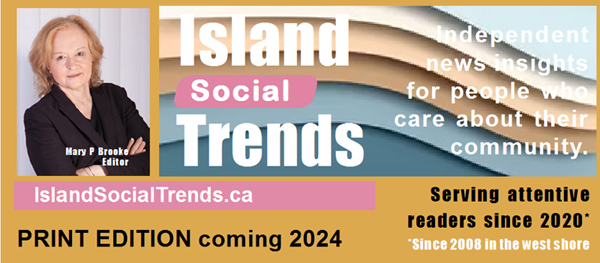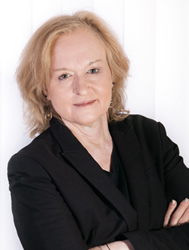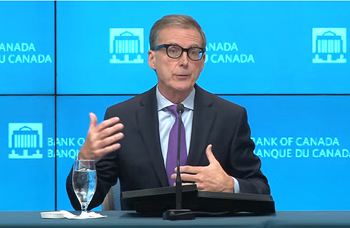
Wednesday October 25, 2023 | VICTORIA, BC [Last updated 10:30 am PDT]
by Mary P Brooke, B.Sc. | Island Social Trends
“Were we surprised by the very rapid run up in food prices? We were,” said Bank of Canada Governor Tiff Macklem today during his media session following today’s bank rate announcement, in answering today’s only question about food prices (as asked by Island Social Trends).
“Part of this is related to global harvest — those are very hard to predict. But of course when Russian invaded Ukraine which is a major wheat producer in particular, this had a major impact on wheat prices that reverberates through all kinds of food products. We did not foresee that,” said Macklem.
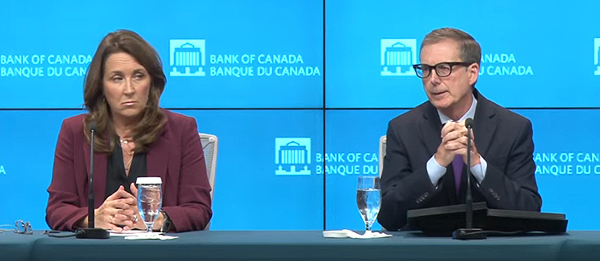
“Food price inflation has been very high. When you look at — it’s been across the food spectrum. Unfortunately this is a problem with inflation when it becomes broad-based there is just no way to avoid it. There’s no question that food price inflation has particularly affected lower income more vulnerable members of society,” said Macklem. That portion of his reply was likely sensitized by the last few months of political leaders pointing out just that.
“This is an important reason why we’ve got to get inflation down. If you look at agricultural prices, they have come down a fair amount, and you are seeing food price inflation come down, with a lag,” the bank governor said.
Macklem said that food price inflation shows “the latest year over year number is about 6% on a three month basis… it’s just under 4%”. He added: “What’s that’s telling you is that we should see some continued easing in (food) price inflation and I think that will be a relief to all Canadians.”
Corporate behaviour is a risk factor:
Macklem did say a few times during today’s media session that “corporate behaviour” around increasing prices during this inflationary cycle is of considerable concern to the bank. He said it “hasn’t normalized”.
Macklem went so far as to say that the corporate behaviour of pushing up prices — and frequently — is a “risk factor” when looking at the overall program of getting inflation back under control.
He itemized other risks as oil prices, structural supply shortages, ‘sticky’ prices (inflation-pushed prices that remain high), and the potential for “new supply chain disruptions” — all of which builds “excess supply”.
“The US economy has been surprisingly strong, while China has slowed more than expected. At the same time, geopolitical tensions have increased,” said Macklem in itemizing other factors having economic impact on Canada.
Macklem expressed deep concern about goings-on around wars. “The Russian war of aggression against Ukraine continues, and Hamas attacks in Israel have ignited conflict in Israel and Gaza. These wars are causing incalculable suffering. They are also hurting the global economy and adding uncertainty to the outlook.”
He also was fairly forthright in saying that it would help if government fiscal policy were better aligned with the bank’s monetary policy.
Getting back to target:
The central bank rate (overnight rate) will remain steady at 5% (bank rate at 5.25% and deposit rate at 5%) and the policy of quantitative tightening will continue, as announced this morning.
The Bank of Canada is aiming to get inflation back into its target range of 2% to 3%, probably by mid-2025 is what the governor said today. The Bank projects that inflation will stay around 3.5% until the middle of 2024, returning to target in 2025.
“Inflation has come down a lot since the summer of 2022, but as every Canadian knows, inflation is still too high,” said Macklem in his opening statement this morning.
“We’ve seen clearer evidence that higher interest rates are moderating spending and rebalancing demand and supply.”
Next updates:
The next scheduled date for announcing the overnight rate target is December 6, 2023. The Bank will publish its next full outlook for the economy and inflation — including risks to the projection — in their monetary policy report on January 24, 2024.
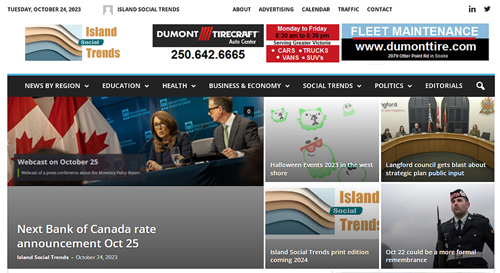
===== RELATED:
- Next Bank of Canada rate announcement Oct 25 (October 24, 2023)
- NDP still pushing for grocery price action (October 18, 2023)
- Macklem: Rates will come down but we’re not there yet (September 7, 2023)
- Bank of Canada holds interest rate steady (September 6, 2023)
- Next Bank of Canada rate decision Sept 6 – BC & Ontario premiers speak up (September 4, 2023)
- 10th Bank of Canada rate increase in 16 months (July 12, 2023)
- Premier Eby on July 12 Bank of Canada rate increase (July 12, 2023)
- Premier Eby: Interest rate hikes impacting people who can least afford it (July 11, 2023)
- Next Bank of Canada update coming July 12 (July 7, 2023)
- Bank of Canada Deputy Governor draws a crowd in Victoria (June 8, 2023)
===== ABOUT THE WRITER:
Island Social Trends Editor Mary P Brooke, B.Sc. (Foods & Nutrition, with sociology and community education), follows food trends through a socioeconomic lens.
Based in the west shore of south Vancouver Island, Ms Brooke reports on the region as well as BC-wide and national news issues that impact households, businesses and communities — with an eye to impact of political decision making on all of that, often with camera in hand.
Mary Brooke is the founder, editor and publisher of Island Social Trends at IslandSocialTrends.ca, which emerged in 2020 on the heels of three previous print publications (MapleLine Magazine 2008-2010, Sooke Voice News 2011-2013, and West Shore Voice News 2014-2020 — which are permanently archived at the Sooke Region Museum).
Mary P Brooke was nominated in 2023 for a Jack Webster Foundation award that recognizes a woman journalist who contributes to her community through journalism.
She reports with the BC Legislative Press Gallery.






